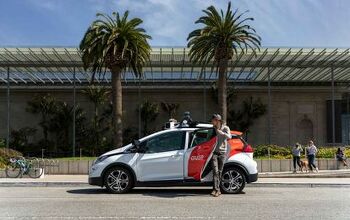Molto Grazie!Treasury Hands Fiat Another 5 Percent Of Chrysler

Usually, when you bring a car from Europe to be made in the U.S., you need to bring something else: Money. You know, for buying real estate for a plant, machinery, that kind of thing. Except when you are Fiat. In that case, a thankful U.S. government hands you yet another 5 percent of Chrysler, as a token of its appreciation, for what amounts to be a token act.
As announced last December, Fiat made good on its promise to build its Alfa-based Dodge Dart in the U.S. According to Reuters,
“Chrysler and Fiat formally committed on Wednesday to the U.S. Treasury Department to produce the 2013 Dodge Dart sedan at a U.S. Chrysler plant.”
With that simple commitment, Fiat has increased its stake in Chrysler to 58.5 percent. By announcing its intentions to build “a highly fuel-efficient car” at a U.S. plant, Fiat reached the final milestone with the Treasury. The government is out of the automaking business, at least as far as Chrysler is concerned. Fiat shares ownership of Chrysler with the UAW. The UAW’s retiree health care trust holds the 41.5 percent. left over after Fiat’s 58.5 percent.
Actually, it is not the new Dodge Dart that got Fiat the last chunk of Chrysler, it is a special anemic edition of said Dart. Equipped with a 1.4-liter turbocharged FIRE engine that also powers versions of the subcompact Fiat 500, THAT Dart is expected to get the required unadjusted combined fuel economy rating of at least 40 mpg. Never mind that the EPA-issued windows sticker probably will say something like 30 mpg. Who are you going to sue, the government?
The 2013 Dart will be built at Chrysler’s plant in Belvidere, Ill.

Bertel Schmitt comes back to journalism after taking a 35 year break in advertising and marketing. He ran and owned advertising agencies in Duesseldorf, Germany, and New York City. Volkswagen A.G. was Bertel's most important corporate account. Schmitt's advertising and marketing career touched many corners of the industry with a special focus on automotive products and services. Since 2004, he lives in Japan and China with his wife <a href="http://www.tomokoandbertel.com"> Tomoko </a>. Bertel Schmitt is a founding board member of the <a href="http://www.offshoresuperseries.com"> Offshore Super Series </a>, an American offshore powerboat racing organization. He is co-owner of the racing team Typhoon.
More by Bertel Schmitt


































Comments
Join the conversation
"it is a special anemic edition of said Dart. Equipped with a 1.4-liter turbocharged FIRE engine that also powers versions of the subcompact Fiat 500" It wont be too bad, supposedly 160hp if its the same engine as used in the 500 Abart, maybe more.
No need for anyone to be surprised at the transfer to Fiat. The deal always was: the Obama administration gets a political exit from bailing out its buddies at the UAW. In exchange for providing an exit that puts a free-market figleaf on a transfer to crony wards-of-the-state, Fiat gets valuable assets for free. Big #1 free asset was the Jeep brand. However, let's never forget that there has been long-term damage to the US as a nation. Washington's act of stealing Chrysler from its owners, coupled with the Administration's naked assaults against Toyota, communicate to investors both here and abroad that there is no rule of law in the US. For all of us, this good day for crony Fiat is a very bad day for freedom from maurading government.
Gee, Bertel, that was a whiney report. Are you upset that an Italian manager turned around a company that German managers nearly destroyed? (Disclaimer: I'm German, my native language is German, my first name is really Friedrich, and my Balkan grandfather escaped from an Italian POW camp in the early days of WW II.) If GM and Chrysler had been allowed to collapse, the whole auto industry supply chain would have gone down with them (stopping production at foreign owned American assembly plants also), and the resulting cost to the federal government and the economy would have been much higher. As it is, the cost to the feds was minimal for their part of the restructuring, since most of the loans were (in the case of Chrysler) or will be (in the case of GM) recovered.
People can correct me if I'm wrong, but while it is true that some non-secured creditors ended up with assets, actual ownership of the company, it is because they brought new money to the table- money that nobody else was going to bring to the table otherwise. That's what happens in every reorganization. The US and Canadian governments brought money to the table justifying their new ownership stakes. They were therefore in position to dictate the terms of the reorganization plan. There was no group of creditors that came out worse than they would have had there been a liquidation. There is no question that the UAW and its pension funds came out better than they would have had there been a liquidation; but the union and its pension and healthcare funds took a haircut like everybody else.